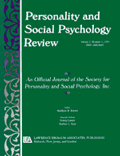Publications
Haslam, S. A., & Reicher, S. D. (2012). Contesting the “nature” of conformity: What Milgram and Zimbardo's studies really show. PLoS Biology, 10 (11): e1001426.
doi:10.1371/journal.pbio.1001426

- Abstract: Understanding of the psychology of tyranny is dominated by classic studies from the 1960s and 1970s: Milgram's research on obedience to authority and Zimbardo's Stanford Prison Experiment. Supporting popular notions of the banality of evil, this research has been taken to show that people conform passively and unthinkingly to both the instructions and the roles that authorities provide, however malevolent these may be. Recently, though, this consensus has been challenged by empirical work informed by social identity theorizing. This suggests that individuals' willingness to follow authorities is conditional on identification with the authority in question and an associated belief that the authority is right.
Haslam, S. A. & Reicher, S. D. (2012). When prisoners take over the prison: A social psychology of resistance. Personality and Social Psychology Review, 16, 154-179.
.jpg)
- Abstract: There is a general tendency for social psychologists to focus on processes of oppression rather than resistance. This is exemplified and entrenched by the Stanford Prison Experiment (SPE). Consequently, researchers and commentators have come to see domination, tyranny, and abuse as natural or inevitable in the world at large. Challenging this view, research suggests that where members of low-status groups are bound together by a sense of shared social identity this can be the basis for effective leadership and organization that allows them to counteract stress, secure support, challenge authority, and promote social change in even the most extreme of situations. This view is supported by a review of experimental research — notably the SPE and the BBC Prison Study — and case studies of rebellion against carceral regimes in Northern Ireland, South Africa, and Nazi Germany. This evidence is used to develop a Social Identity Model of Resistance Dynamics.
Reicher, S. D. & Haslam, S. A. (2006). Rethinking the psychology of tyranny: The BBC Prison Study. British Journal of Social Psychology, 45, 1–40.
![]()
- Abstract: This paper presents findings from the BBC Prison Study: an experimental case study that examined the consequences of randomly dividing men into groups of prisoners and guards within a specially constructed institution over a period of eight days. Unlike the prisoners, the guards failed to identify with their role. This made the guards reluctant to impose their authority and they were eventually overcome by the prisoners. Participants then established an egalitarian social system. When this proved unsustainable, moves to impose a tyrannical regime met with weakening resistance. Empirical and theoretical analysis addresses the conditions under which people identify with the groups to which they are assigned and the social, organizational and clinical consequences of either doing so or failing to do so. On the basis of these findings a newframework for understanding tyranny is outlined. This suggests that it is powerlessness and the failure of groups that makes tyranny psychologically acceptable.
Haslam, S. A. & Reicher, S. D. (2005).
The psychology of tyranny. Scientific American Mind, 16 (3), 44–51.
![]()
Haslam, S. A. & Reicher, S. D. (2004).
Visión crítica de la explicación de la tiranía basada en los roles: Pensando más allá del Experimento de la Prisión de Stanford. Revista de Psicología Sociale, 19, 115-122.
![]()
Haslam, S. A. & Reicher, S. D. (2003).
Beyond Stanford: Questioning a role-based explanation of tyranny. Dialogue (Bulletin of the Society of Personality and Social Psychology), 18, 22-25.
![]()
A 2012 paper in PLoS Biology argues that tyranny thrives as a result of engaged followership not 'blind' conformity
A major examination of the social psychology of resistance -- integrating data from the BBC Prison Study, the Stanford Prison Experiment, and a range of significant case studies -- was published in Personality and Social Psychology Review in 2012
The definitive account of the study was published in the British Journal of Social Psychology (2006). Shorter treatments were published in other outlets including Scientific American Mind (2005)


